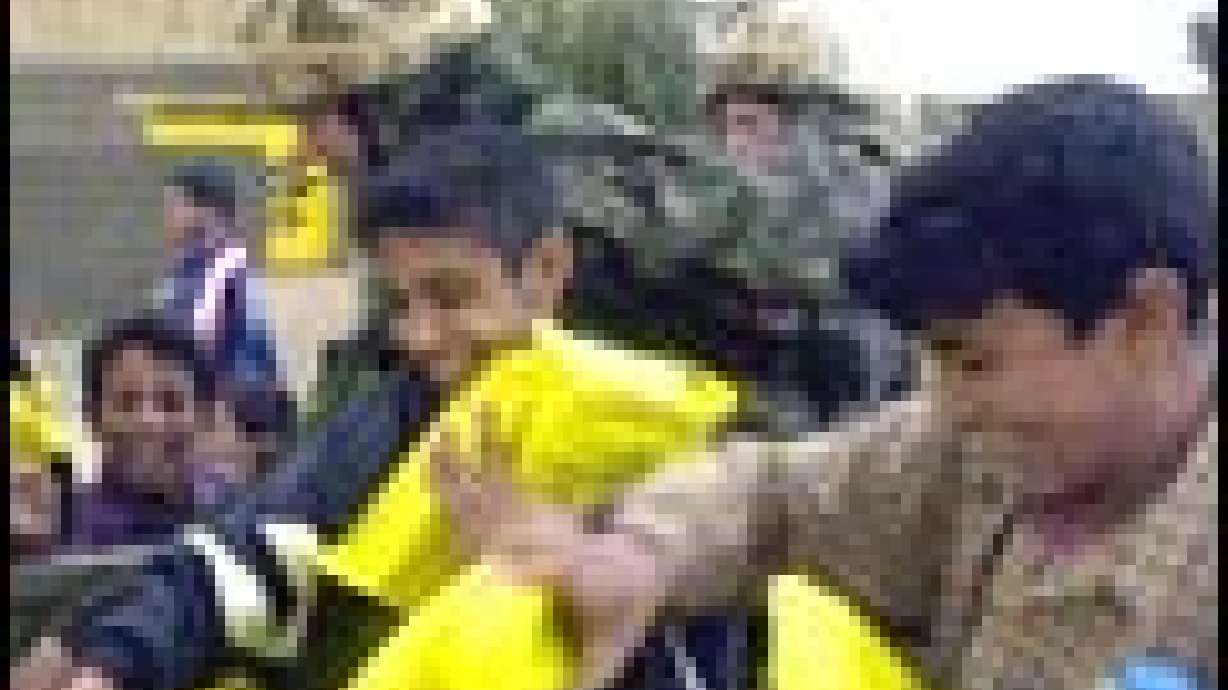Estimated read time: 3-4 minutes
This archived news story is available only for your personal, non-commercial use. Information in the story may be outdated or superseded by additional information. Reading or replaying the story in its archived form does not constitute a republication of the story.
CAMP AS SAYLIYAH, Qatar (AP) -- British and U.S. officials reported signs Tuesday that the tide of war in southern Iraq may be turning in their favor: Iraqis are increasingly warming to their presence, and some troops felt safe enough to wear berets rather than combat helmets in towns firmly under their control.
Those signals, however, were tempered by continued resistance by forces loyal to Saddam Hussein, a major battle looming for Baghdad, and possible fallout from the killing of at least seven Iraqi women and children by U.S. soldiers at a checkpoint.
In the southeastern corner of Iraq, though, British forces pointed to developments that they said signaled a shift in their favor may be under way.
Lights flickered on for the first time in months in the port city of Umm Qasr, and schools and shops were reopening, said Group Capt. Al Lockwood, a spokesman for British forces in the Gulf.
Significantly, more civilians were informing foreign troops about the whereabouts of paramilitary forces and members of Iraqi leader Saddam Hussein's Baath Party, British officials said.
In four towns -- Umm Qasr, Zubayr, Rumeila and Safwan -- British troops felt so secure that they swapped their combat helmets for less protective berets, and adopted a less aggressive posture in wielding their weapons, British officials said. Lockwood said the berets and relaxed posturing make the soldiers appear more friendly and approachable, and serve as a confidence-building measure on both sides.
"It shows that we have confidence in them, and they can have confidence in us," he said.
In Nasiriyah, where the coalition has met with stiff resistance, civilians were now helping U.S. special forces stage raids and find troops loyal to Saddam, Brig. Gen. Vincent Brooks told reporters Tuesday at a news conference in Qatar.
Brooks said local Iraqis are "increasingly willing" to aid the U.S. and British forces throughout the main areas of fighting.
Marines were aided by 100 tribal fighters who helped battle Iraqi forces and remove explosives from a bridge north of Nasiriyah. Their help also resulted in the capture of POWs, he said.
In the western desert, after Army Rangers destroyed a commando headquarters a few days ago, civilians helped Army troops locate buildings where regime ammunition was held and helped troops remove it for destruction, he said.
One senior U.S. Central Command official said late Monday that he sensed the "tipping point" -- when Iraqis would turn against the regime entirely -- was near in Basra and Nasiriyah.
Lockwood stressed that tensions were still high in Basra, Iraq's second-largest city, where British forces have skirmished almost daily with forces loyal to Saddam while trying to provide humanitarian aid to the city's 1.3 million people.
Military operations continued in the region, including a raid on Baath party members in the town of Safwan, said another British spokesman, Col. Chris Vernon.
But Lockwood said residents were increasingly willing to approach British troops who have ringed Basra to provide information about known paramilitaries and other loyalists.
"They realize that we are there to liberate them, not to occupy," he said.
In addition, more humanitarian aid was flowing into the region, including from the United Nations and other aid organizations, he said.
"Within the southern area of Iraq, we see a large degree of normality starting to appear amongst the Iraqi population," Lockwood said.
U.S. and British officials have acknowledged the expected support for coalition troops by anti-Saddam Shiite residents of Basra and other southern towns hasn't happened to any large degree.
They attributed the residents' wariness to the fact that when Shiites did rise up in 1991, allied forces largely abandoned them and left them to be punished or killed by the Iraqi leadership.
"They have suffered tragically, enormously under the Saddam Hussein regime," Lockwood said. "And although it's taken some time because of the events of 1991, they're beginning to gain the confidence now, they know we're not going away."
(Copyright 2003 by The Associated Press. All Rights Reserved.)









